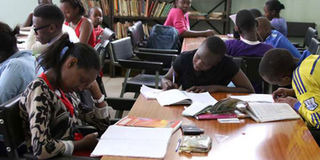Local publishers missed opportunity at the Maktaba Awards event

Students from various primary and secondary schools in the country study at Macmillan Library in Nairobi on September 22, 2015. PHOTO | JEFF ANGOTE
What you need to know:
Don’t get me wrong, these awards are very important for feeding minds (as much as unga is for feeding stomachs).
In fact, I have often said in this space that it would be ideal to have a library in each neighbourhood so that children and adults have access to books. So an award that celebrates libraries can only encourage others to start libraries in their schools and communities and hopefully, result in a more reading nation.
One of my more unpleasant childhood memories is of a certain holiday visiting my grandparents when I was eight years old. It was during a particularly harsh drought.
We had to wake up early in the morning with my cousins to go to the shopping centre and stand in line early morning for drought relief food. Each family would receive pre-boiled beans and some yellow unga. The first time this unga came to independent Zimbabwe, it came from Kenya. The Kenyans, I later learnt, had received the unga as donation from the American people the year before but after the Kenyan drought ended, they passed on the unga to Zimbabwe. People in Zimbabwe did not know this, though. Until this day in Zimbabwe, the starch component for meals with yellow unga is called ‘sadza reKenya’ (Kenyan ugali). Then, as now, Kenya and Zimbabwe were prone to droughts. I have often wondered why, in all these years, knowing the conditions of the two countries, we have not yet had any contingent plans for those drought years. Better food storage in years of surplus, I imagine, would ensure that international aid organisations do not dump more ‘Kenya’ in our countries during drought years while our farmers fail to sell surplus crops in good harvest years.
DONATED BOOKS
I thought of this ‘Kenya’ quandary after the 2015 MAKTABA Awards celebrating the best libraries in this country.
Don’t get me wrong, these awards are very important for feeding minds (as much as unga is for feeding stomachs).
In fact, I have often said in this space that it would be ideal to have a library in each neighbourhood so that children and adults have access to books. So an award that celebrates libraries can only encourage others to start libraries in their schools and communities and hopefully, result in a more reading nation.
That said, one expects an award organized by the Kenya Library Association, the Jomo Kenyatta Foundation and Goethe-Institut Kenya would be just a tad more Kenya-centric in some ways with library books. In many ways it was, except for one sponsor that stood out. Book Aid International.
Book Aid International donated 200 books to each of the winners in the eight categories.
So what’s my problem with Book Aid International?
According to their brochure, “The majority of these books are donated by around 100 UK publishers…” In the week just after the Jomo Kenyatta Prize and the Burt Awards were announced, I wonder whether it was absolutely impossible for the organisers to talk to Kenya Publishers Association (KPA) and ask their publishers to donate previous titles to the awards for the libraries. It certainly sounds a much better alternative for Kenyan readers of all ages than to have libraries full of books that British publishers are saving from pulping by donating to the poor people of Africa. This seems in many ways like cultural colonisation. Some will argue that a book is a book is a book, but it’s not that simple.
One of the reasons why I wrote a couple of children’s books was that, when I was growing up, there was not a single children’s book I encountered with a child who looked like me. My standard of beauty and humanity was very much shaped by the books I read.
DUMPED BOOKS
I thought the greatest form of beauty was to have ‘lips as red as the rose, skin as white as snow and hair as black as ebony’ like Snow White and, oh yeah, that hair had to be as long as Rapunzel’s.
It took affirmation from wonderful parents after I had complained about my hair at 12, for me to be aware that I was absolutely fine just as I was. I have also encountered essays in writing workshops of young black men and women who talk about ‘the wind rushing through my hair’ or describe teeth being ‘as white as snow.’
So perhaps MAKTABA Award organisers do Kenyan readers that do have access to libraries no favours when they dump books that have been rescued from pulping in the UK for Kenyan libraries as prizes. It is also unnecessary because people are writing and books are available in Kenya that children and adults can relate to. There is room for international books as well, but when it’s a Kenyan Library Award, it seems to make more sense to me to make it local before we go international. If, however, KPA were approached and refused to donate any books for this worthy library cause, all apologies to the organisers of MAKTABA Awards and shame on you, KPA. Hungry minds are bad enough but cultural colonisation can be just as bad.





